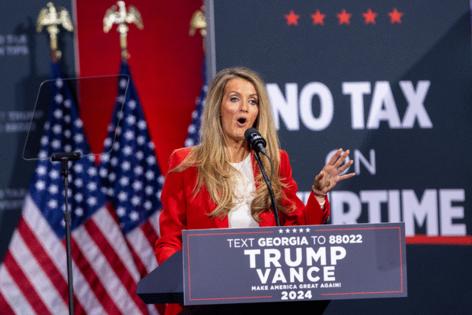Editorial: Cryptocurrencies triumphed alongside Trump on Election Day. Let's finally get some rules in place
Published in Op Eds
Donald J. Trump won big on Nov. 5, and so did cryptocurrencies. The crypto kingpins who poured a fortune into his campaign coffers were rewarded with flattering remarks on the campaign trail and even a pledge to create a new U.S. strategic reserve of digital currencies. Prices soared after the election.
In case anyone wondered if crypto would be a priority for the new administration, wonder no more: Just two weeks after Election Day, Trump’s social-media company reportedly entered talks to buy a crypto venue once headed by ex-U.S. Sen. Kelly Loeffler, R-Ga., a wealthy trading executive who now co-chairs Trump’s inaugural committee.
Cynics no doubt will see an unholy alliance between a business known for scams and an incoming president convicted of business-related felonies, but we’re staying optimistic.
We see an opportunity for sensible regulation of cryptocurrencies, which are digital files that stand in for government-issued money and trade on electronic markets worldwide. This page has pushed for strict rules to help ensure the integrity of global finance and reduce risks for the retail customers that make up much of crypto’s growing customer base.
With the new administration and a GOP-controlled Congress, the U.S. finally is poised for fresh legislation to close the regulatory gaps and conflicts that have kept crypto operations mostly offshore. That in turn could enable big U.S.-based financial institutions to provide needed discipline and professionalism in a marketplace they’ve mostly kept at arm’s length.
Chicago is well-positioned to lead the way, as it has in the futures and options markets pioneered at the city’s exchanges.
None of those positive steps were ever going to happen under President Joe Biden, largely because of one person: Gary Gensler, the outgoing chair of the Securities and Exchange Commission. This former Goldman Sachs investment banker made it his business to attack crypto with a costly barrage of enforcement actions.
Under Gensler, the SEC embarrassingly missed the big one when it failed to uncover the abuse of customer funds at Sam Bankman-Fried’s notorious FTX crypto exchange before it collapsed in 2022. After that, Gensler’s tenure started to look like a revenge tour.
Earlier this year, a federal judge in Utah overseeing an SEC case against a crypto startup unloaded on the agency, saying it acted in bad faith, ordering it to pay sanctions and bashing what he characterized as the SEC’s misleading statements. It’s not every day a federal judge calls out any federal agency so harshly, and it wasn’t the only crypto case where Gensler & Co. overreached.
Still, Gensler is unrepentant, claiming in a Nov. 14 speech that “court after court has agreed with our actions,” and noting that he only brought cases against a relatively small slice of the crypto biz. Ah, so much to do and so little time!
Gensler also repeated his contention that crypto has no purpose other than laundering money and scamming people. “This is a field,” he said, “in which over the years there has been significant investor harm.” Yes, and that’s true partly because the U.S. never got its act together to effectively regulate the business.
“Further,” Gensler went on, “aside from speculative investing and possible use for illicit activities, the vast majority of crypto assets have yet to prove out sustainable use cases.” Is it really up to a federal bureaucrat to decide that?
From payment systems to settling trades across borders, crypto could have plenty of legal, practical uses if it were allowed to develop like other financial innovations. As Chief Executive Officer Walt Lukken noted at the Futures Industry Association’s annual Expo in Chicago last week, “Let the marketplace figure out the uses for it. It’s not for regulators to determine.”
Lukken is a former regulator himself. No wonder Trump got a roar from the crowd in July when he promised a crypto trade group that he would fire Gensler on “day one.” Sure enough, Gensler announced plans to step down on Jan. 20, Trump’s inauguration date.
Meanwhile, Gensler’s counterpart at the Commodity Futures Trading Commission is preparing to leave his chairmanship after a few successes such as overseeing the introduction of Exchange-Traded Funds products for the crypto crowd. But mostly, CFTC Chair Rostin Behnam has been waiting — and waiting — for Congress to clarify how crypto should be handled.
Earlier this year, the GOP-controlled House approved a somewhat tortured attempt at crypto legislation, ignored in the Democrat-controlled Senate, that at least provides a starting point for progress in the months ahead. The European Union, meanwhile, already is much further along, and its rulemaking efforts should help inform the U.S.
The best approach to crypto, like any burgeoning financial market, is not to spray legal buckshot into the crowd, SEC-style. No one seriously expects that U.S. legislation would turn a blind eye to the huge potential for fraud and malfeasance. On the contrary, strong rules will be good for the markets, and especially good for the youthful, inexperienced investors, some of whom are teenagers, who have taken to casually trading crypto via their phone apps.
It will take months and perhaps longer to lay out an appropriate framework for this complicated business. At the same time, it can’t happen soon enough.
_____
©2024 Chicago Tribune. Visit chicagotribune.com. Distributed by Tribune Content Agency, LLC.




























































Comments